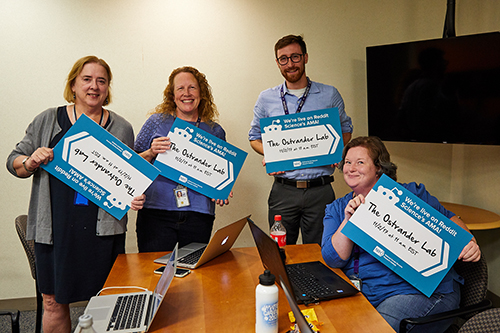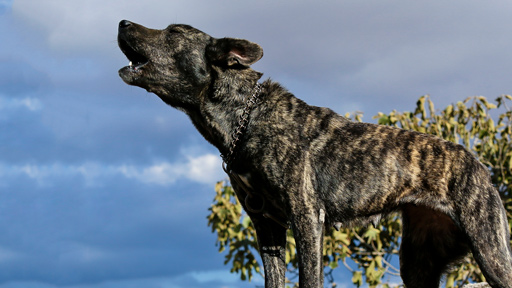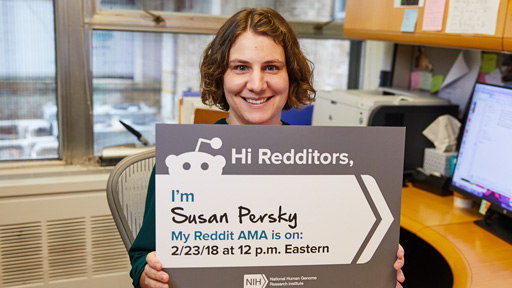The goal of The NHGRI Dog Genome Project is to sequence the genomes of 10,000 dogs in the next four years. Dog genomes hold a wealth of information for understanding natural variation in dog populations, like body size or fur type, and for learning more about how the genomes of both dogs and humans contribute to health and disease.
On November 2, 2017, experts from The NHGRI Dog Genome Project turned to Reddit - a social news website and discussion forum - to answer questions from the Reddit community as part of an "Ask Me Anything" (AMA).
Our AMA hosts were Elaine Ostrander, Ph.D., chief of the Cancer Genetics and Comparative Genomics Branch at NHGRI; Heidi Parker, Ph.D., staff scientist; and Dayna Dreger, Ph.D., senior research fellow. Both Dr. Parker and Dr. Dreger work in Dr. Ostrander's lab at NHGRI. Here, we recap the event (or you can check out Reddit Science's page to view the full "AMA"!)
Overall, the team answered nearly 20 questions on topics that ranged from using genome sequencing to determine dog pedigrees, the most recent, common ancestor of all dog breeds, and feral Chihuahuas!
Check out a few of the questions and answers below, or visit the Reddit AMA on The NHGRI Dog Genome Project, and stay tuned for more NHGRI AMAs in the future!

From BMonad: Hi - certain breeds of dogs suffer diseases from inbreeding and general lack of genetic diversity. While I understand that this can be avoided through proper breeding programs, can any of the work that you are doing help prevent this from happening (perhaps through some form of a test required or certificate that can be requested from breeders)? I think it would be great if I could purchase a certified "disease free" dog, or maybe this is not possible prior to breeding. Vet bills can be very pricey.
From Ostrander_Lab: Much of our work involves identification of disease-causing or risk-associated variants for breed-specific diseases. While we don't market any of these tests commercially ourselves, the science is often picked up by commercial operations that will offer the tests to breeders and dog owners. So, in that sense, yes, there are ways that breeders can test their breeding stock for various disorders prior to breeding and many breeders will offer pups from parents with known genetic results. Our understanding of dog breed relationships will continue to provide valuable information regarding potential disease-causing genetic variants in more breeds.
The team also responded to curiosity regarding what the dog breeds would look like without the world of dog breeders.
From greenvortex: Are there breeds of dogs that are essentially "natural", i.e. they would exist without breeders?
From Ostrander_Lab: The closest we could get to that answer would be to look at some of the feral dogs around the world. There are domestic dogs that exist within cities and towns worldwide, surviving from scavenging. While these populations have some influence from stray dogs of known breeds, they are primarily a free-breeding population of their own. Interestingly, they most often appear as mid-sized, short-haired, fawn or red in color, with slightly curled tails.
And finally, one question related to our experts collecting DNA from their own dogs to sequence!
From TelemarketingEnigma: What breeds are you most interested in sequencing, if you can get a sample? If you have all sequenced your own dogs, did you find any surprises?
From Ostrander_Lab: Thanks for the great questions! Ultimately, we are interested in sequencing all breeds of dogs! Our lab started with the American Kennel Club Breeds, and investigators worldwide are sequencing hundreds of other breeds. We've come together as a community to develop a project called DOG10K, which has a goal of sequencing 10,000 canines over the next 4 years. If you have an interesting breed, let us know. We'd love to add it to our dataset. To answer your second question, those of us with breeds that were eligible (had pedigrees) were added to the dog genome project. No special surprises, but each and every dog contributes data and ultimately knowledge to the project.




